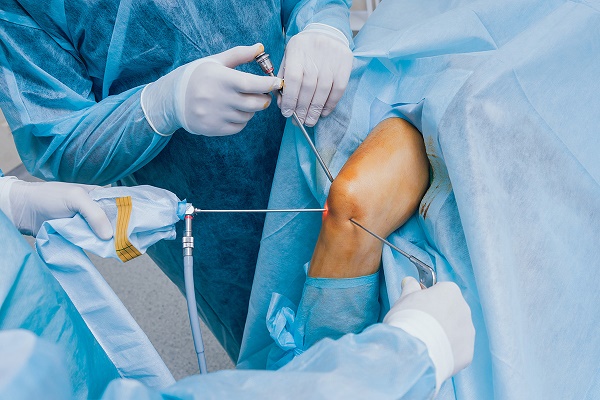03 Feb 2026
Rhinoplasty Revision Surgery in Mohali: Cost When Your First Nose Job Fails


Dr. (Prof) Aditya K Aggarwal
22 May 2025
Call +91 80788 80788 to request an appointment.
Arthroscopic knee surgery is a revolutionary procedural technique utilized within the field of orthopedics to address a variety of knee-related issues. This minimally invasive surgery allows orthopedic surgeons to diagnose and treat conditions within the knee joint using small incisions and a specialized camera known as an arthroscope. The key advantage of arthroscopic knee surgery is its ability to minimize pain, shorten recovery time, and enhance the overall surgical experience for patients.
The knee joint is one of the most complex and essential joints in the human body, bearing weight and enabling movement with substantial range and flexibility. Unfortunately, knee problems can arise due to various factors, including athletic activities, aging, and degenerative diseases, leading to pain and reduced mobility. At Livasa Hospitals located throughout Punjab, including Livasa Mohali, Livasa Amritsar, Livasa Hoshiarpur, Livasa Khanna, and Livasa Nawanshahr, our specialists focus on providing advanced solutions such as knee arthroscopy to restore quality of life and functional mobility to our patients.
Arthroscopy involves integrating a camera equipped with a lighting source into the knee through a small incision. This procedure provides orthopedic surgeons with a detailed view of the internal structures of the knee, including the cartilage, ligaments, and meniscus. The term “arthroscopy” literally translates to “joint viewing,” which accurately describes the insight gained through this technique. It enables surgeons to diagnose conditions such as torn ligaments, meniscal tears, and arthritis.
The dual benefits of diagnosis and treatment can be performed simultaneously during arthroscopic surgery. The surgical component typically involves the removal of damaged tissue or the repair of a torn ligament, all while maintaining an efficient and patient-centered approach to care.
The decision to proceed with arthroscopic knee surgery often hinges on an accurate diagnosis of knee-related issues. Some of the common indications that pave the way for this minimally invasive procedure include:
There are numerous advantages to choosing arthroscopic knee surgery over traditional open knee surgery. These benefits include:
The actual procedure for arthroscopic knee surgery generally involves the following steps:
Most arthroscopic knee surgeries are performed on an outpatient basis. Patients are typically discharged on the same day and can begin rehabilitation shortly after, depending on the nature of the surgical intervention.
Recovery time after arthroscopic knee surgery varies based on the individual, surgical procedure undertaken, and adherence to rehabilitation protocols. Generally, patients can expect:
At Livasa Hospitals, our orthopedic specialists in Punjab, including those at Livasa Mohali and Livasa Amritsar, will closely guide patients through their recovery process to ensure effective rehabilitation and the best possible outcome.
While arthroscopic knee surgery has high success rates and offers substantial benefits, it is essential to acknowledge that any surgical procedure carries inherent risks and potential complications. Possible complications include:
Understanding these risks is essential in making informed decisions regarding treatment options. Patients are encouraged to communicate openly with their orthopedic specialists abroad to address any concerns prior to proceeding with surgery.
| Procedure Type | Benefits | Recovery Time |
|---|---|---|
| Arthroscopic Surgery | Less invasive, reduced pain, minimal scarring | 1-2 weeks |
| Traditional Open Surgery | Comprehensive access to knee structures | 2-6 weeks |
Arthroscopic knee surgery represents a significant advancement in orthopedic treatment modalities, leveraging modern technology for effective diagnosis and treatment with minimal disruption to bodily tissues. For patients experiencing knee pain in Punjab, especially those located near our facilities in Livasa Mohali or Livasa Amritsar, consulting our knee surgery specialists can provide clarity on options, elucidate the appropriate procedural approach, and meticulously outline the expected recovery roadmap.
Our orthopedic specialists at Livasa Hospitals are committed to delivering tailored care that not only addresses present knee-related concerns, but also empowers patients to reclaim active and fulfilling lives through comprehensive treatment and proactive rehabilitation. If you are considering arthroscopic knee surgery or have persistent knee pain, schedule a consultation today by calling +91 80788 80788 or visit our website for appointment bookings.
Don't let knee pain hold you back. Book an appointment at Livasa Hospitals and get back to enjoying life to the fullest!
Rhinoplasty Revision Surgery in Mohali: Cost When Your First Nose Job Fails
Plastic Surgery After Massive Weight Loss: Body Contouring Packages in Mohali
ENT + Cosmetic in Mohali: Septoplasty for Breathing with Cosmetic Rhinoplasty Offers
Livasa Healthcare Group Corporate Office,Phase-8, Industrial Area, Sector 73, Sahibzada Ajit Singh Nagar, Punjab 160071
| Mohali | +91-99888 23456 |
| Amritsar | +91-99887 49494 |
| Hoshiarpur | +91-99883 35353 |
| Nawanshahr | +91-75081 82337 |
| Khanna | +91-98888 05394 |